Climate activist and writer JANE ROGERS introduces her new collection, Fire-ready, and examines the connection between life and fiction

 STUFF OF NIGHTMARES: A kraken attacking a merchant ship, 1810, by Pierre Denys de Montfort
STUFF OF NIGHTMARES: A kraken attacking a merchant ship, 1810, by Pierre Denys de Montfort
REAKTION Books has carved out a niche in the market with its fascinating animal series. Since launching some 20 years ago, it’s applied a natural sciences and humanities approach to explore everything from elephants to ants, looking at how the species have been impacted by humans around the world. It’s a method that’s continued by Martin Wallen in Squid.
He brings an academic lens to the subject, tracing the deep-sea terror of kraken mythology through to the contemporary scientific understanding of the cephalopod, two perspectives brought together by an exploration of how they’re represented in art and literature.
Supported by intriguing titbits of information about their biology, Wallen frequently stresses the “unknowability” of squid to science — their oesophagus passes through their brain, their movement and vision are simultaneous kinetically and their eating habits are fearsome — they “prey on almost anything that does not eat them first.” This unknowability inspires fear in the way they could prosper at the expense of humans.

GORDON PARSONS is enthralled by an erudite and entertaining account of where the language we speak came from

200 years since the first dinosaur was described and 25 after its record-breaking predecessor, the BBC has brought back Walking with Dinosaurs. BEN CHACKO assesses what works and what doesn’t

ALEX DITTRICH hitches a ride on a jaw-dropping tour of the parasite world











